
Maybe another time I could think about my first time with marijuana… I was almost always in contact with drugs, in one way or another, without me knowing it. From the normalisation in our families in relation to the use of alcohol, sugars or drugs in many of our gatherings.
My experience with drugs has been mostly pleasant and very introspective. I feel it has helped me to reflect on many aspects of my life, as well as identity, responsibility, ups and downs, etc. I have also had the will to learn more about drugs as it is something that surrounds us constantly, it is better to at least have some information and know what you can experience and if there is a possibility to reduce the risk.
Living in a marginalised area on the outskirts of the city, exposes you to a culture, street environment and an inescapable past of each community, in which young people are involved in numerous problems with the police.
In my case, I have been stopped in the street on different occasions as part of ‘routine checks’. The result, regardless of the amount, is always violence: shouting, hitting, pulling, theft of belongings, police abuse, and a feeling of profound corruption in the system.
I think only once out of ten times that I have been detained I was presented before the Public Prosecutor’s Office to comply with the corresponding sanction for consuming cannabis in a public space.
I live in a highly marginalised and excluded area of Iztapalapa. Police presence is not synonymous with feeling safe. Every day in the neighbourhood we live with numerous drug users without us knowing it. But policies are focused on punishing users of certain psychoactive substances and blatantly omits other major problems generated by drug prohibition, institutional corruption and the hypocrisy of the political class.
Nothing changes here because they do not want to make public the big business of illegality. This very illegality undermines development by tying deprived communities to violence and police abuse.
The truth is that being a user of psychoactive substances and the accumulation of experiences lived throughout my life has led me to meet a large number of people who, like me, are users and have also had similar or even worse experiences with the police.
During meetings with friends, we discuss experiences that reveal the extent of injustice that we live on a daily basis. But we also organise. In collaboration with my friends (especially Irene Flores), we began to manage and set up a self-managed collective (La Lucha) that later led to cultural, recreational and information activities for the neighbourhood and the dissident and different communities that live there.
For four years we have been working to open up spaces so that the youth of the eastern periphery can exercise their full right to freedom of expression, thought and peaceful expression. We encourage artistic work and the exchange of information and create spaces to foster a sense of identity and belonging to the community. This is a key way to support our neighbourhoods.
Today we lead a network of projects that are linked to other independent and self-managed collectives, promoting sport, the arts, and a culture of peace. We are supported by young artists, artisans and sportspeople who live in the neighbourhood and have put aside their apathy to inform themselves, learn and share knowledge.
It seems to me that the best thing people can do is to participate in their neighbourhood and get to know the people around them. Mobilising in favour of the environment, each other’s rights, and for better access to education all are fundamental to me.
I believe that the state should have a comprehensive and realistic vision of the undeniable situation and the resounding failure of the drug policies that have been deployed until now. A key way to start is opening up the rights of users to consume responsibly (self-cultivation), in addition to ceasing all persecution against consumers.
Surely there are better solutions than what we have continued to do for years.
Photo: Antonio Perea / Tonatiuh Martínez Moreno
Tonatiuh Martínez Moreno’s story was originally compiled by ReverdeSer Colectivo. This story has been edited for clarity.
More stories from Mexico
More stories about Proportionality & Criminal Justice




